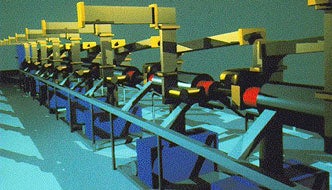
CAD rendering of the accelerating structure at the Gaerttner LINAC Center at Rensselaer.
The U.S. Department of Energy (DOE) has provided a $9.44 million grant to help refurbish and upgrade the electron linear accelerator (LINAC) at the Gaerttner LINAC Center at Rensselaer. Once the upgrades are complete, the Institute will be home to some of the nation’s most advanced technology for measuring neutron interactions with nuclear materials.
Despite their sophistication, today’s nuclear models cannot predict neutron interactions with the accuracy required for certain applications. In such cases, experiments—like those conducted at the LINAC center—provide the missing information. Accurate nuclear data are important for the design of safe, reliable nuclear reactors and for reducing uncertainties in criticality safety applications.
The DOE grant was secured through the Naval Reactors Program and the Nuclear Criticality Safety Program. Funds include $7.4 million awarded directly to Rensselaer and $2.04 million to SLAC National Accelerator Laboratory to help design the replacement LINAC parts. The grant will also help fund a state-of-the-art research and education laboratory where nuclear engineering students will have access to LINAC experiments that reinforce theory and methodology discussed in class. Students also will be able to conduct experiments as part of research.
All the work we perform here is done by our students. If we develop a system for neutron scattering, for example, it is invented by our graduate students. The new lab will provide similar opportunities for our undergraduate students, who will then graduate with hands-on experience with a state-of-the art linear accelerator.”
“This grant is the latest recognition of the essential role played by Rensselaer in advancing nuclear research worldwide,” said Rensselaer President Shirley Ann Jackson. “The high-accuracy nuclear interaction data generated at our Gaerttner LINAC Center has broad applications and is used by researchers and nuclear engineers around the globe. These investments and renovations will elevate our capabilities and ensure that we continue to meet current and future nuclear data needs.”
“Rensselaer Polytechnic Institute’s research is vital to developing new energy technology and protecting our national security,” said Senator Kirsten Gillibrand. “The Rensselaer community has long played a key role in this critically important field, and these federal funds will help ensure it remains a leader in research for years to come.”
The total project cost—for the LINAC upgrades and lab—is nearly $12 million. Rensselaer will provide the remaining funds.


